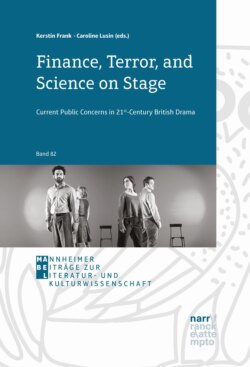Читать книгу Finance, Terror, and Science on Stage - Группа авторов - Страница 17
На сайте Литреса книга снята с продажи.
1. Immigration in Contemporary British Discourse
ОглавлениеThe challenges and opportunities offered by large-scale immigration are central to Britain’s political discourse in the 21st century. At the time of writing, the coming departure of the United Kingdom from the European Union (‘Brexit’) is dominating the headlines; the process was triggered by, among a range of lesser grievances, a combination of dissatisfaction and hope: dissatisfaction with the perceived loss of control of who enters the country and for how long, and the hope of better times to return once unregulated immigration, from European countries as well as from further abroad, were stopped. The arguments traded between the increasingly entrenched camps do not contain much that is new: in fact, the popular sentiment that led to the narrow victory of the Brexiteers has not changed substantially since 1980, when the punk group The Clash sang
They say the immigrants steal the hubcaps
Of respected gentlemen
They say it would be wine and roses
If England were for Englishmen again (“Something about England”)
Britain, like any other country, has her share of xenophobes and welcoming citizens alike, but the political discourse contains a few elements that are less pronounced elsewhere. The most fundamental of these is the constant influence of Britain’s insular position; there is no need to negotiate joint problems on a daily basis; no roadworks need to be coordinated, no rules for police in hot pursuit across the border have to be set up. What is more: the petty border traffic that generates so much awareness of neighbourhood and similarity in mainland Europe simply does not exist. The border between Northern Ireland and the Republic could have served as an example, and there is much greater fluidity of movement nowadays, but the border is still too burdened down with memories of recent conflict. Most other trips abroad require sea travel or flights, and the one exception, the channel tunnel opened in 1994, only came into being after decades of warnings about the invasion of Britain by French rats and rabid dogs – a fear that is best understood in terms of unwanted immigration and which was seen abroad to embody “British paranoia” (Ipsen). It is easier to cast ‘Johnny Foreigner’ as a dangerous or ludicrous character if you do not regularly get the chance to observe him at home. As a result, using national stereotypes in politics, entertainment and other public discourses requires the speaker to set irony markers, but not to apologise up front or afterwards. Often it is enough to identify the genre to make the cliché acceptable: TV comedy is a good example. A show like ‘Allo ‘Allo! (1982–92), set in Nazi-occupied France and employing excruciatingly predictable behaviour patterns for comic effect, may well have attained cult status for that very reason. One of the bestselling books of 2015 was Stephen Clarke’s semi-ironically patriotic history of Anglo-French relations entitled 1000 Years of Annoying the French.
Another peculiarity of the public debate on immigration is the recollection of Britain’s imperial past, the “wine and roses” of which The Clash sing. Nostalgia, of course, is not confined to one country or culture, but a sense of tradition that rests on commonly held assumptions of what is acceptable is palpable everywhere in the United Kingdom. Its manifestations range from the quaint (Henry VIII-faced rubber ducks) to the incendiary (Ulster Orange marches). Thus, during the campaign leading up to the Brexit referendum, there was no lack of voices that expressed a longing for the England before harmful immigration began; the definition of ‘harmful’ was and is a core concern of the debate, and it is duly mirrored in the play under review here. From this debate, a sense emerged in which desirable immigration from Commonwealth countries was contrasted with the noxious influx of Eastern Europeans. This may be due to familiarity: immigrants from India, Pakistan and Bangladesh as well as those from the Caribbean have been arriving in large numbers from 1948, when the troopship Empire Windrush brought some 500 migrants from Jamaica – not the first to arrive from the West Indies, but the best-reported ones.1
The Windrush episode is compulsory in any account of post-war immigration to Britain, however brief. Similarly, a reference to Enoch Powell’s “Rivers of Blood” speech on immigration in 1968 is required; when the Conservative politician cast himself as Virgil seeing “the River Tiber foaming with much blood” he was widely seen to condone, if not to invite, violence against immigrants. The speech has been quoted and misquoted ever since, but the rivers of blood had failed to materialise in the 20th century. One remarkable facet of the history of immigration to Britain has been its comparative absence of violence. There have been riots, but even those of Brixton (London), Toxteth (Liverpool), Handsworth (Birmingham) and Moss Side (Manchester) in 1981, the fiercest instances of public unrest outside Northern Ireland, did not cause a single casualty. For all the belligerent rhetoric from left and right race relations in Britain until recently have been comparatively peaceful. Against this background, terrorism and the increase in hate crimes since the referendum, across the whole spectrum from xenophobic graffiti to (in one instance in 2016, deadly) attacks on Polish immigrants, is unusual and worrying. It is too early to discern the influence the debate on immigration accompanying that on Brexit will have on British drama and theatre, but to judge from past experience it will be there.
